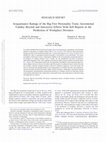Papers by Benjamin McLarty
Academy of Management Proceedings, 2013

Journal of Business and Psychology, 2015
ABSTRACT Purpose Drawing from core self-evaluations (CSE) theory, we argue and demonstrate that d... more ABSTRACT Purpose Drawing from core self-evaluations (CSE) theory, we argue and demonstrate that disposition plays an important role in explaining the way job applicants respond to testing procedures in the selection process. We demonstrate that CSE predicts job candidate reapplication intentions, acceptance intentions, and recommendation intentions—even after controlling for test performance. Moreover, we show that CSE moderates the relationship between perceived fairness and applicant behavioral intentions. Design/Methodology/Approach Drawing from a sample of 194 applicants for the position of police officer, this research uses data at four different time periods to explain the impact that applicant CSE has on outcomes in a high-stakes (i.e., civil service) testing environment. Findings Our results indicate that behavioral intentions resulting from selection processes are attributable at least in part to applicant CSE and that self-serving attributions are not the only relevant driving factor. We also show that CSE influences the relationship between perceptions of fairness and behavioral intentions. Implications Theoretically, this manuscript explains why and shows how CSE is a driving force behind intention formation. This research provides practitioners with insight to the formation of applicant reactions and intentions showing that important perceptions about the organization can be impacted by CSE. We also demonstrate that CSE impacts selection test performance. Originality/Value This is the first study to examine the impact of CSE on applicant responses related to the formation of organizationally relevant outcomes
Academy of Management Proceedings, 2014
Journal of Business and Psychology, 2014
ABSTRACT

Leadership & Organization Development Journal, 2013
ABSTRACT Purpose ‐ The purpose of this paper is to explore relationships between proactive person... more ABSTRACT Purpose ‐ The purpose of this paper is to explore relationships between proactive personality and organizational citizenship behaviors (OCBs). Moderators between these constructs are proposed in order to explain varying levels of dispositional impact on work behavior. These relationships were also tested to see whether proactive personality should be considered a strong or weak trait. Trait activation theory and social exchange theory are used to develop hypotheses. Design/methodology/approach ‐ Data collected via a targeted sampling strategy from 178 supervisor-subordinate dyads spanning multiple industries and organizations were used. Hypotheses were tested using hierarchical linear regression. Findings ‐ Results indicate a positive relationship exists between proactive personality and organizationally directed citizenship behaviors, and that this relationship is moderated by both job autonomy and job meaning. Originality/value ‐ The paper is one of the first to explore the relationship between proactive personality and citizenship behaviors directed at the organization. It also bolsters the strong trait argument by demonstrating that, even in conditions of low autonomy and meaning, highly proactive individuals will still perform OCBs.
Journal of Management History, 2014
Purpose -The aim of this paper is to illustrate the instrumental role of physician Caroline Hedge... more Purpose -The aim of this paper is to illustrate the instrumental role of physician Caroline Hedger during the first half of the twentieth century, with her emphasis on worker health, which influenced American society and helped to improve working and living conditions of people across the USA. Design/methodology/approach -Drawing on archival newspaper clippings, original journal articles and books written by the subject, historical manuscripts and other labor history resources, this manuscript pulls together information on this topic in a unique way to give a broad view of the impact of Hedger and her important role not only for the city of Chicago, but the nation as a whole.

The Journal of applied psychology, 2015
It is widely established that the Big Five personality traits of conscientiousness, agreeableness... more It is widely established that the Big Five personality traits of conscientiousness, agreeableness, and emotional stability are antecedents to workplace deviance (Berry, Ones, & Sackett, 2007). However, these meta-analytic findings are based on self-reported personality traits. A recent meta-analysis by Oh, Wang, and Mount (2011) identified the value of acquaintance-reported personality in the prediction of job performance. The current investigation extends prior work by comparing the validities of self- and acquaintance-reported personality in the prediction of workplace deviance across 2 studies. We also hypothesized and tested an interactive, value-added integration of self- with acquaintance-reported personality using socioanalytic personality theory (R. T. Hogan, 1991). Both studies assessed self- and acquaintance-rated Big Five traits, along with supervisor-rated workplace deviance. However, the studies varied the measures of workplace deviance, and the 2nd study also included ...











Uploads
Papers by Benjamin McLarty